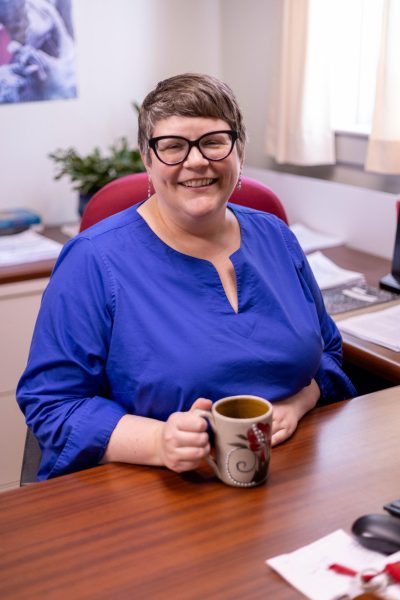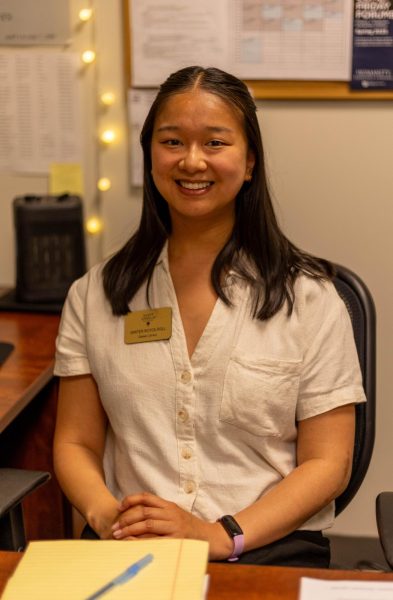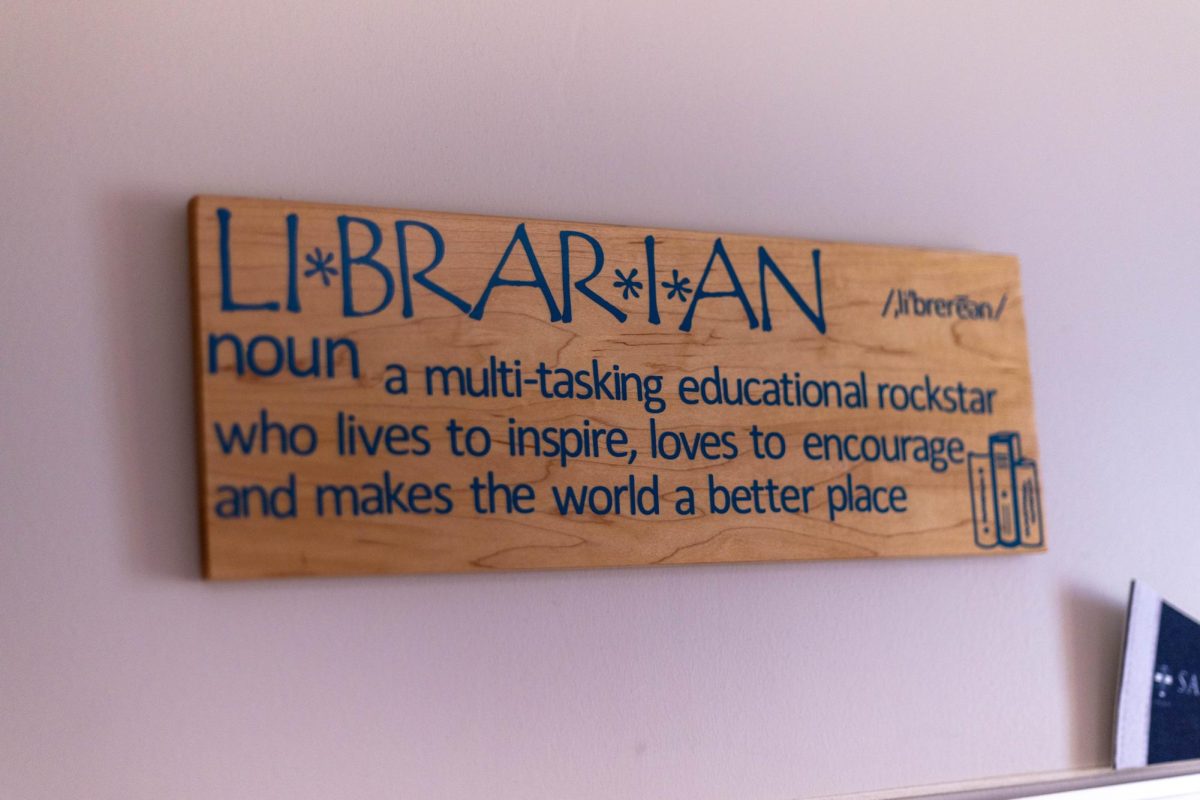In recent weeks, continuing local trends of restricting literary resources, the federal government has sent a message about the humanities and access to knowledge. The future of libraries and humanities programs has become increasingly questionable, with the impacts of funding cuts and legislative moves felt across the state of New Hampshire and even here at Saint Anselm.
Under recommendation from the Department of Government Efficiency (DOGE), the Trump Administration announced significant cuts to the National Endowment for the Humanities (NEH), a federal agency which provides funding for hundreds of learning opportunities across the country. This move has already had impacts on New Hampshire.
Michael Haley Goldman, the Executive Director of New Hampshire Humanities, a non-profit organization which supports programs across the state’s municipalities, explained that about half of their funding comes from the federal government. They must match that funding dollar-for-dollar, a requirement supported by various fundraising initiatives and sponsorships.
“There’s a bunch of different ways that we collect enough money to make sure that we’re bringing in every federal dollar we can so that it’s used in the state of New Hampshire and then goes into the communities around the Granite State,” Haley Goldman shared.
He went on to explain that at the end of March, the NEH announced that it was canceling all of the grants to state and jurisdictional humanities councils, and that included New Hampshire Humanities. Grants intended to support a University of New Hampshire teacher program on early American history, propel the Black Heritage Trail to implement programming for the 250th Anniversary of the Declaration of Independence, and build a new library in Mont Vernon were canceled.

Programs exploring a humanities-centered approach to the sciences and providing Holocaust education are on the horizon, but because of the grant cancellation, New Hampshire Humanities never got the chance to offer their financial support.
In response, New Hampshire Humanities has issued an action alert on its social media accounts, calling upon supporters to defend resources for Granite Staters.
Saint Anselm College has a deep connection to the organization, with Prof. Christine Gustafson and Prof. Gary Bouchard both serving as board members of the NHH. The two professors sent a message to faculty members informing them of their concern regarding the budget cuts.
On a campus where opportunities to engage with the humanities are still abundant, but nevertheless subject to change, Prof. Bouchard noted, “The opportunities to do this in small towns throughout New Hampshire are very limited. New Hampshire Humanities brings the humanities to the people in those towns that most people simply drive by.”
“The reckless slashing of the National Endowment for the Humanities separate from Congress, which created and funded it, is more than a matter of national politics,” Prof. Bouchard emphasized. “The impacts will be felt very locally. Conversations will diminish at the very time when they are most critical to remind us who we are as citizens and people with a common sense of belonging.”
The NEH is just one of the federal programs being targeted by DOGE and the Trump Administration; the Institute of Museum and Library Services (IMLS) was also undercut. According to NPR, 80% of NEH staff and 100% of IMLS staff have been placed on administrative leave.
The IMLS provides funding and support to the libraries, archives, and museums across the United States. According to the American Library Association, the executive order called for the IMLS to be “eliminated to the maximum extent of the law.” It also “orders the Office of Management and Budget (OMB) to reject any budget requests from IMLS other than funds needed to shut down the agency.”
Librarians in Manchester, including those on Saint Anselm’s campus, have been grappling with the future of the vital educational and community resource.
Denise M. van Zanten, the Library Director for the Manchester City Library and Legislative Chair for the New Hampshire Library Association, shared that the local library will not be impacted unless the State Library, which receives funding from the IMLS, cannot find other funding sources for inter-library loans, the “Talking Books” program, and oversight of the Libby app.
According to a March 18 statement from the Manchester City Library, “This funding, if not available, will dramatically affect the above-mentioned services that we currently provide to our patrons, crippling the collaboration between New Hampshire libraries, and drastically reducing access to materials library patrons would not otherwise have access to.”

Here at Saint Anselm, the impact of funding cuts has already been seen. According to Geisel Library Director John Dillon, digitization projects have been dealt a huge blow.
“A collaborative special collections digitization project with Assumption University and University of Maine System libraries and research centers, funded by a grant from the NEH, has just been eliminated midstream,” Dillon shared.
The only way that project could continue was through outside support.
“Thankfully, college benefactors Richard and Lorraine Lavalliere, via their Lavalliere Fund for Franco-American Culture, have enabled Saint Anselm College to show impactful leadership in helping to bring this important work to completion,” Dillon said. “We are deeply grateful to the Lavallieres for their continued crucial support.”
In addition, the inter-library loan (ILL) program could also be impacted. “We do borrow publications for our community from state and public libraries, and lend our titles out to those sites also,” Dillon explained. It is very possible that potential federal funding cuts could reduce some of these ILL services, at least on a limited basis.
For Melinda Malik and Winter Royce-Roll, the two full-time research librarians at Geisel, libraries have an important role in both college and public communities. Their desire to work in libraries was driven by their passion for helping people. According to their experiences, that is exactly what libraries do: help.
As Malik shared her story, she was alarmed by an article from The New York Times about North Dakota lawmakers passing a bill to restrict library books deemed obscene.
Moved by this headline, she stated, “This is the perfect example of why we need the humanities.”
“Whenever you read an article about this, it’s always through a political lens. I have to wonder, why is that? Why is access to information politicized?” Malik questioned. “Hubs for communities identifying access to information, yeah. Why is that politicized? All of those people who are lawmakers all had access to that information to get where they are.”
Royce-Roll, who has loved libraries since she was a child, entered the field to be one of the people students could turn to for support, and she wants to make sure that continues.
“You risk so much when you take away people’s right to knowledge, absolutely, and it’s a really big curb on people’s freedom to [use] censorship or [prevent them from] being able to access the things that they need,” she shared.
Despite these moves to dismantle educational infrastructure, librarians want students to know that they are here. Both Malik and Royce-Roll encourage Saint Anselm students to make appointments and utilize the online resources the library offers, but most importantly see the space as a center for community.
Advocates also want to make it clear that they are going to fight.
Not wasting any time, the New Hampshire Congressional Delegation made a pledge to protect funding for agencies such as the IMLS and NEH. The delegation was made up by U.S. Sen. Maggie Hassan (D-NH), U.S. Sen. Jeanne Shaheen (D-NH), Congressman Chris Pappas (D-NH), and Congresswoman Maggie Goodlander.
For Prof. Ann Holbrook, who advocates for public and academic libraries both within and beyond the classroom, the preservation of this resource is critical: “If people stop reading great works of literature, or learning history or science, or understanding the value of silent thought, we will continue to lose the intellectual curiosity and human empathy we need to survive in some peace, comfort, and joy.”


